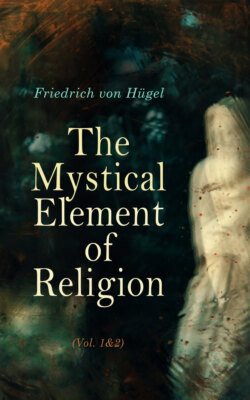Читать книгу The Mystical Element of Religion (Vol. 1&2) - Friedrich von Hügel - Страница 69
На сайте Литреса книга снята с продажи.
3. Men who have been devoted to her spirit. Its vitality.
ОглавлениеNo wonder then that, from the contemporary circle of her devoted friends and disciples onwards, Catherine should have attracted, throughout the centuries and in many lands, a remarkable number of deep minds and saintly characters. The ardent young Spaniard, St. Aloysius Gonzaga, and the shrewd and solid Savoyard Bishop, St. François de Sales, love to quote and dwell upon her example and her doctrine. Mature theologians, such as Cardinal Bellarmine, the hard-headed controversialist; Cardinal Bona, the liturgical and devotional writer; and Cardinal de Berulle, the mystical-minded founder of the French Oratory; and again, such varied types of devotedness as Madame Acarie, the foundress of the French Reformed Carmelites; the Baron de Renté, that noble Christian soldier; Bossuet, the hard and sensible; and Fénelon, the elastic and exquisite,—all love her well. Such thoroughly representative ascetical writers again as the Spanish Jesuits Francisco Arias and Alfonzo Rodriguez; the French ones, Saint-Jure and Jean Joseph Surin; the Italian, Paolo Segneri; the Pole, Lancisius; and the German, Drexel, all drew food and flame from her character and doctrine. Then at the beginning of the Nineteenth Century, Friedrich von Schlegel, the penetrating, many-sided leader of the German Romantic school, translated her Dialogue. In our own time Father Isaac Hecker, that striking German-American, loved her as a combination of contemplation and external action; Father Faber strongly endorsed her conception of Purgatory; Cardinal Manning occasioned and prefaced an admirable translation of her Treatise; and Cardinal Newman has incorporated her Purgatorial teaching in the noblest of his poems, “The Dream of Gerontius.” Indeed, General Charles Gordon also can not unfairly be claimed as her unconscious disciple, since her teaching, embodied in Cardinal Newman’s poem, was, besides the Bible and “Imitations,” his one written source of strength and consolation, during that noble Christian captain’s heroic death-watch at Khartoum. And among quite recent or still living writers, Mr. Aubrey de Vere has given us a refined poetic paraphrase of her Treatise, and Father George Tyrrell has developed its theme in one of his most striking Essays.[42]
I too have, in my own way, long cared for her example and teaching, and for the great questions and solutions suggested by both. A dozen times and more have I visited and lingered over the chief scenes of her activity; and the literary sources of all our knowledge of her life have been dwelt upon by me for twenty years and more.
I have but very few new details and combinations to offer, in so far as her external life is concerned. It is with regard to the growth of her historic image and the curious vicissitudes which I have been able to trace in the complication of her “Writings”; as to her spirit and teaching; and as to the place and function to be allotted in the religious life to such realities and phenomena as those presented by her, that I hope to be able to contribute something of value. For although the substance and the primary phenomena of religion are eternal, they appear in each soul with an individuality and freshness pathetically unique; and their attempted analysis and apprehension, and their relations to the other departments of human life, necessarily grow and vary. Indeed it would be truly sad, and would rightly tempt to disbelief in an overruling Providence and divine education of the human race, if the four centuries that intervene between our Saint and ourselves had taught us little or nothing of value, in such matters of borderland and interpretation as nervous health, the psychology of religion, and the distinguishing differences between Christian and Neo-Platonic Mysticism. Whole Sciences, indeed the Scientific, above all the Historic spirit itself, have arisen or have come to maturity since her day. Hence the realities of her life, as of every religious life, remain fresh indeed with the deathless vitality of love and grace, and but very partially explicable still; and yet the highest intellectual honour of each successive period should be found in an ever-renewed attempt at an ever less inadequate apprehension and utilization of these highest and deepest manifestations of Authority, Reason, and Experience,—of the Divine in our poor human life.
